Translation of the article dedicated to 20 years of Rammstein in July issue of Metal Hammer.
(Special thanks to Rammstein USA, Murray for the translations, Rammsteinfans Germany for providing the scans)
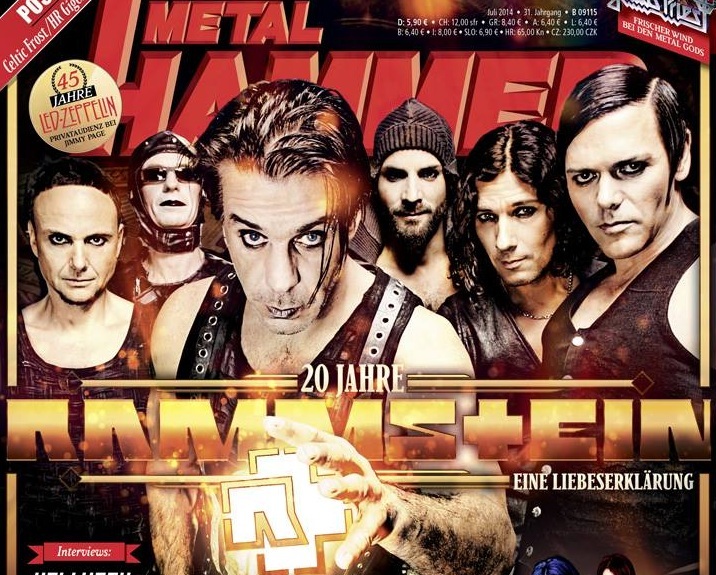
The rolling “R“, celebrates an anniversary: for twenty years, Rammstein has fascinated us with the most prominent and, at the same time, most provocative hymns that German Metal has ever produced. It’s high time to make a toast in the jubilee’s honor.
You sometimes wonder what it might be. The history of a band. All those words, paragraphs, lines, laden with facts from the, “Good ol’ days”. And then you begin to read – and within seconds, it arises: this warm, comforting feeling of reliability. Your own, personal memories from the past flare up once more, and blend in with the dry statistics. And suddenly, you can feel it again: the sensation that all but knocks the wind out of you as your chest is being pressed up against the barrier, but you refuse to budge, even an inch, to give up your hard earned place in the front row. Or the moment when the small hairs on your arms begin to smolder as it feels like the pyrotechnics explode right in front of you. The tension right before the refrain, when every fiber of your being takes on a voice of its own and screams along with the lyrics. The goosebumps and the fulfillment when you turn around and recognize that all the people around you feel exactly the same. In short – these rare moments in life, when Here and Now are the only things that count. There are but a few acts who are capable of bestowing those moments on us. Rammstein is one of them. And that despite – and here we go again with those dry facts – not starting off under the best of circumstances. Normally, bands that have reached these heights, with extensive and internationally successful careers, are a) not from Germany, and b) play another kind of music and c) are rather mainstream and, at that, with lyrics written in the English language. That Rammstein nevertheless made it, is thanks to four things: talent, passion, a highly-set standard of quality and a sense of timing.
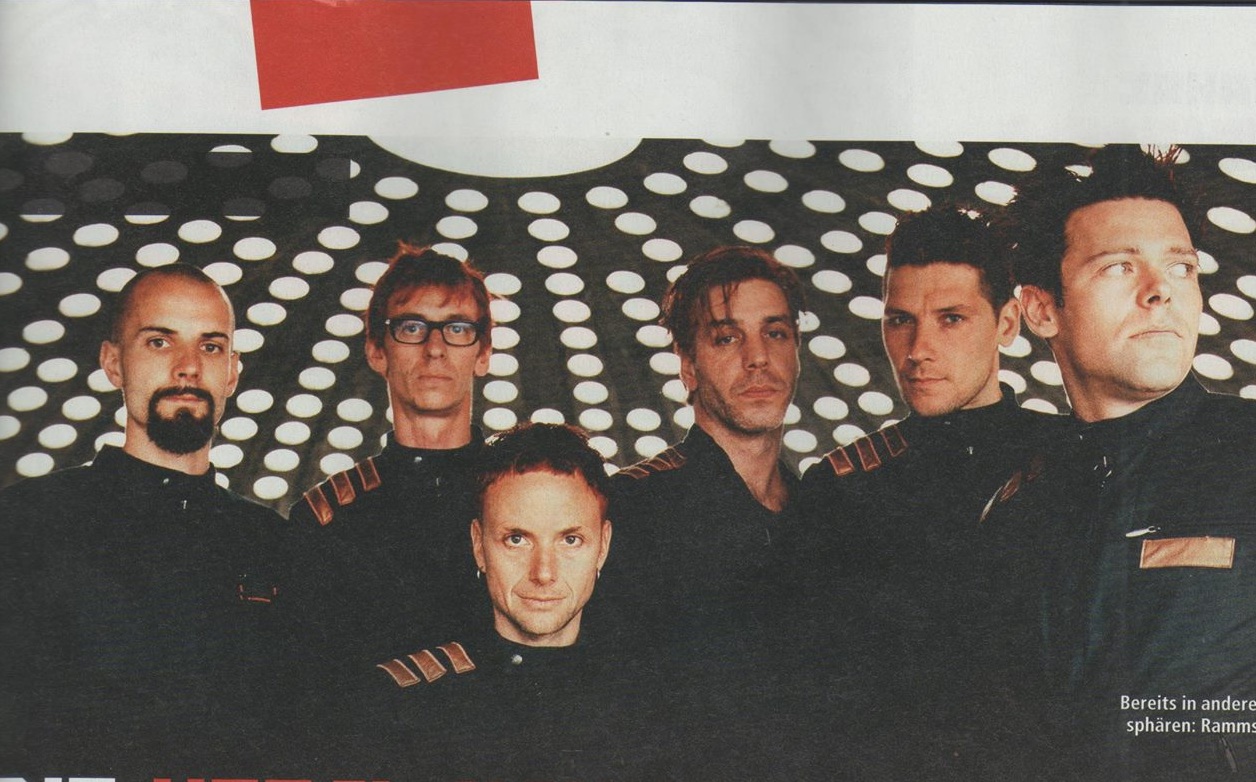
THE FIRST DANCE STEPS
Although they have refined, perfected and enhanced these four cornerstones during the course of the past twenty years, they’ve been a part of Rammstein’s success story from the very beginning. This was already made clear in July, 1995. The venue was the recording studio, Chateau de Pape in Hamburg. Till Lindemann, Christian „Flake“ Lorenz, Richard Kruspe, Paul Landers, Christoph Schneider and Oliver Riedel – Rammstein, for short – were tense. In a few minutes there would be a first. They were about to play the eleven songs from their debut album exclusively for a journalist from Metal Hammer. How will he react? Which songs will be received the best? There’s no routine yet, no eager expectations, no diagrams – everything was brand new. Indeed, Rammstein had the live-experience, but an album presentation is quite different from a stage show. The months’ worth of polishing the details, and all the discussions about which song was the best and therefore should end up on the finished album – everything would now be scrutinized. Moreover, not everything ran smoothly during the production. The recordings as such, produced under the direction of Jakob Hellner in the Polar Studios in Stockholm from the beginning of April to the end of May, were not the problem – it was the first mix, supervised by Hellner and his sound engineer Carl-Michael Herlöffson. “We had to interrupt, since the result was too much pop for our liking,” explained guitarist Richard Kruspe, who oversaw the proceedings on site. “It all started out well, and in the end, all of us were satisfied. Hellner had another vision of Rammstein than what we had.” What followed was tug of war of sound concepts, musical visions and one, clear directive.
Hellner placed his vote on a techno oriented production, he had an almost modest guitar sound in mind – and a keen eye on the dance scene in the republic. The band members, on the other hand, wanted the full depth and breadth and the kind of sound that rumbled and roared rather than grinded and trickled. The least common denominator was the concept of, “Tanzmetall” [dance metal]. The problem: Hellner’s emphasis was on “dance” and Rammstein’s, on “metal”. But then they all agreed and the Dutchman Ronald Prent was taken aboard, replacing Herlöffson, and Hellner agreed to a fresh start. “We had to start over from the beginning, with another course of action, in any case, for the ratio between guitars and synthesizers,” Richard Kruspe remembered. It soon became clear, that not only did Rammstein have the talent, but also the intent of not allowing the production to get watered down or lose anything. They wanted success, but not necessarily through bending over backwards. When the course was set, Jakob Hellner proved to be the perfect sparring partner, and it’s not without cause that he’s been taking part in every recording the band has made to this day.
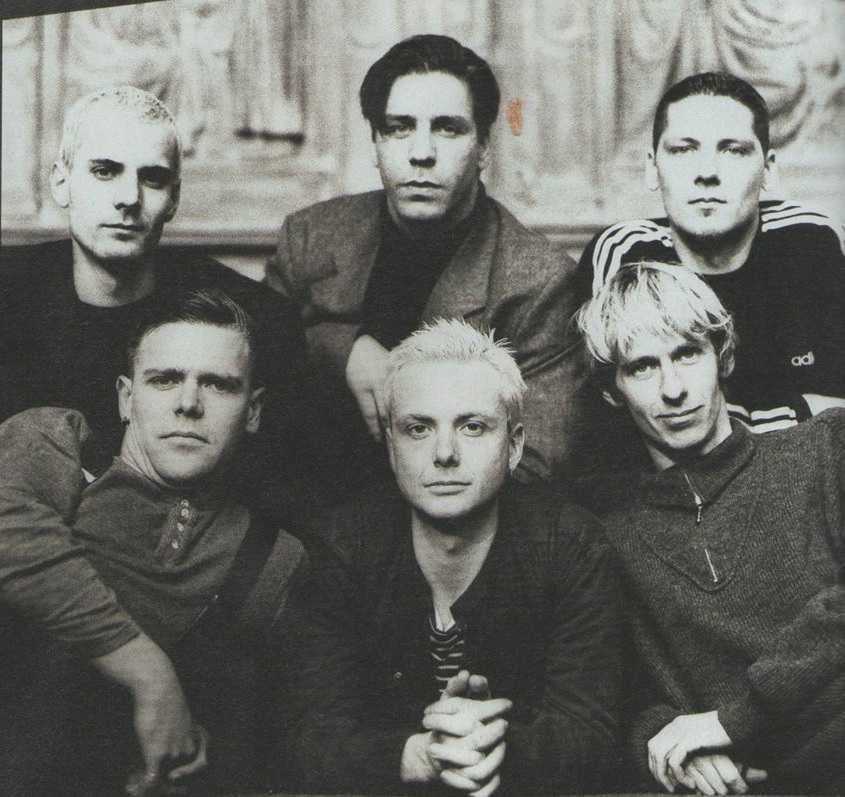
COURAGE TO BE OBSTINATE
Hellner had no idea at this point in time that he would creatively be so closely associated with Rammstein for the next twenty years. Neither did the musicians in Rammstein dream of a massive career in the midst of summer, 1995 – they were busy with other, more pressing matters. They were meeting up with journalists in their hometown Berlin, for the first interview marathon in the history of the band. Most music critics could not easily pinpoint either Rammstein or HERZELEID. Interesting album? In any case, yes. Commercially viable? Probably. Obstinate? Indeed! As obstinate as the band itself. As a venue for the press invitation, the band had chosen the Berliner cinema, ‘Blow Up’. A black and white UFA-movie was playing and the journalists were placed, in jarring spotlights, right in front of the big screen, while the band was sitting in the semidarkness, in the front row. Perhaps apt, Rammstein was playing role reversal. “I find questions profoundly more interesting than the answers,” the singer, Till Lindemann, explained. As aloof as the band was on this, their first press encounter, they were as extroverted on stage. This was already widely known – by now, cars all over the capital were plastered with Rammstein bumper stickers.
It was already a few months since the band had made their first, official performance – on the 14th of April, 1994, a mere 15 people stood in front of the stage at the naTo club in Leipzig; now hundreds showed up at the gigs.
The power, which was apparent already at the first Rammstein shows, was also what brought manager Emanuel Fialik onto the field. He understood the band’s potential, signed Rammstein to his Pilgrim agency and finally negotiated a pioneering deal with the representatives of the Hamburg based label, Motor Music, who were to release HERZELEID. Rammstein didn’t think twice about accepting the offer. “Right from the moment you begin to make music, of course you want recognition and success,” the bass player, Oliver Riedel, clarified. “When bands state that they aren’t interested in achievements, that is nothing more than factious denial. Why would we have anything against our music being so commercially viable that we can make a living from it?”
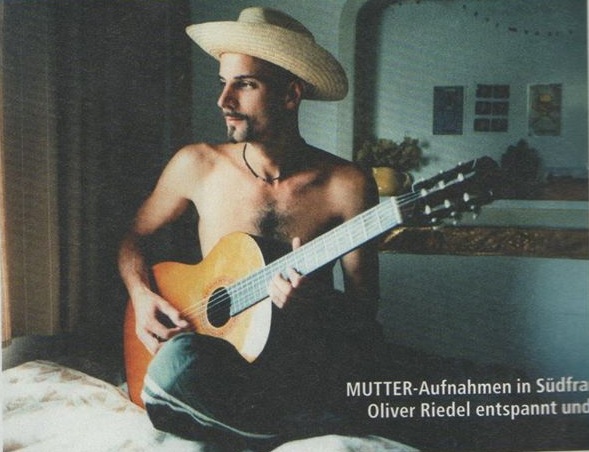
LOVE AND PAIN
His words would become reality in only a short time, but Riedel had, of course, no idea about it then. Up until the release of HERZELEID on the 24th of September, 1995, Rammstein was a band who only had a demo tape for show, and above all lived off their reputation as extraordinary performers. Now they had to prove that they could transfer their blazing stage energy onto a recording. It worked. HERZELEID could be compared to a musical explosion. The album was musically captivating and lyrically astonishing. All the extravagant play with aphorisms and unusual phrasing fascinated the fans. The band themselves called their linguistically violent tidings, “Love songs” – an understatement. “Naturally, love songs of the severe kind,” reasoned lyricist Till Lindemann. “There’s also a vulgar kind of love, and that suits our music very well. The question being how you define love, or whether you could also contravene the more extreme forms of love.”
Even if Rammstein doesn’t call their songs, “Love songs“ anymore, but rather chooses a slightly less blatant description, they were not wrong. The link between the beautiful and the grotesque, and the knowledge that love cannot exist without pain or loss, is an old truth, only Rammstein interpreted this in a new, unique and, yes, often exaggerated manner. But that is precisely what’s so exceptional about the band: you can’t help but listen, whether you like it or not.
Anyone who hears Rammstein, even if it’s only in passing at a friend’s, listens up – What was that? What did the vocalist just sing?! “Ich riech’ dich nur, ich spüre dich, ein Raubtier das vor Hunger schreit, witter’ ich dich meilenweit…” It’s menacing. And bestial. However – and this is also what made Patrik Süskind’s bestseller, “The Perfume”, so successful almost a decade earlier – as it’s remarkably fascinating, because it lets us stare into the abyss. Gruesomely beautiful – Rammstein gave this expression a whole new dimension.
CREATIVE CONTRASTS
More and more people were roped in. HERZELEID was only the first step. Reaching number 99 on the German charts was a good effort, but it could clearly go further. Rammstein was not only literally on fire, but also burning for more. And more, they got. Just short of two years after their debut, on the 22nd of August, 1997, to be precise, their second album was released. It had the suave, yet loaded with innuendo, title SEHNSUCHT. Longing, the scorching pining for something. And, of course, longing as in the formative concept of German literature. Art and music. Rammstein knew all that’s incorporated into this, single word, and how to convey it into the Here and Now. That they did with keen ears, even if they did it by combining the crass, extreme and harsh with the beautiful, with melodies and catchy lines. The most successful fusion of these two opposites was the song, “Engel”. With an intro so striking, that within seconds, it turned into flesh and blood while Lindemann rhymed: “Wer zu Lebzeit gut auf Erden, wird nach dem Tod ein Engel werden,“ – and a hit was born. For the first time, Rammstein got airplay.
The visual adaptation of SEHNSUCHT was also sensational. Every band member got his own cover. The arrangement for the six images was made by the Austrian artist, Gottfried Helnwein, who had just designed Scorpion’s album, BLACKOUT. Rammstein tipped the hat to the original with a special kind of homage – the forks, which poked the singer Till Lindemann in the eyes, were the same ones used in Helnwein’s BLACKOUT self-portrait. Things were also happening in the case of the moving images – since the budget was noticeably larger than during the HERZELEID era, the band could express themselves more. With accomplishment – the “From Dusk Till Dawn”- inspired video for, “Engel” earned an Echo-award in March of 1998. From then on, Rammstein’s videos played a crucial part in the building of the band’s image.
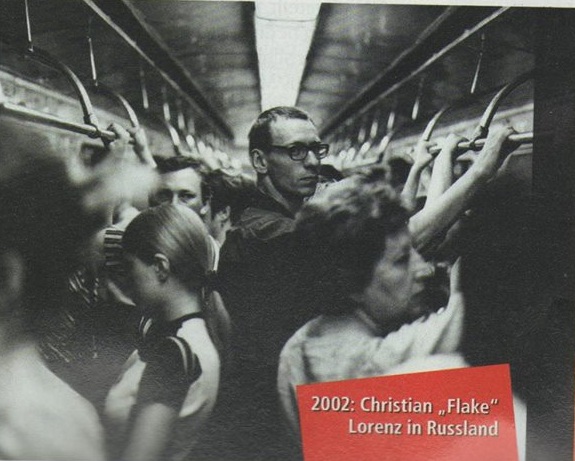
ON THE OTHER SIDE OF THE LINE
But right from the start, this medium also brought the controversial attitude of the band even more clearly into the public eye.
The criticism rained down when Rammstein, in 1998, made their video for the Depeche Mode cover, “Stripped“, based on material by Leni Riefenstahl (from the 1936 Olympic Games in Berlin). “A provocation,” said Lindemann regarding the subject, “and one that most likely crossed the line. We wouldn’t publish the video in this form again.”
Three years later, the band made a definitive statement against their falsely perceived right-wing orientation: “Links 2-3-4” from the 2001 album MUTTER was a strong political statement. Flake Lorenz stated it was “to get rid of all the prejudices. We march, but we are on the left, absolutely and definitively left oriented.“ The guitarist Paul Landers expressed himself somewhat more decisively. “We view the world as something else than split into left and right. But for this song we use the black-or-white metaphors, which the journalists seem to find so important, to explain ourselves.”
With that, there’s no longer a need for Rammstein to explain themselves. They weren’t only regarded as superstars in Germany, where they were selling out the largest venues in the republic, and not just because of the performance itself but they also impressed with their original and sumptuous stage show, made to look like a delivery room. Things were also running smoothly abroad, Europe was caught in Rammstein’s grip and the skip across the Atlantic worked out well too. From being a supporting act – with, among others, Kiss through Latin America, and with Korn and Limp Bizkit throughout the United States – to having achieved Headliner status. A sensation for a band whose set list largely consisted of German songs. But another old truth was valid here: A good song is always a good song.
This was also true regarding, “Sonne“, another hymn from the MUTTER album and, to this day, a cornerstone in Rammstein’s live show. Worldwide, the fans immediately took the song to their hearts – but the origins of the song are even more interesting. “At first, “Sonne” was written as an anthem for the boxing Klitschko brothers, and thus, the working title for this song was, “Klitschko”,” Lindemann explained. What he did not know then, was two things: 1, one of the boxers became a seasoned politician in the meantime, and 2, twelve years later, “Sonne” got attention from a totally different direction – the Folk musician Heino recorded the song for his cover album MIT FREUNDLICHEN GRÜSSEN, and Rammstein politely thanked him in their own, special manner – with a joint performance at the Wacken Open Air festival last year.
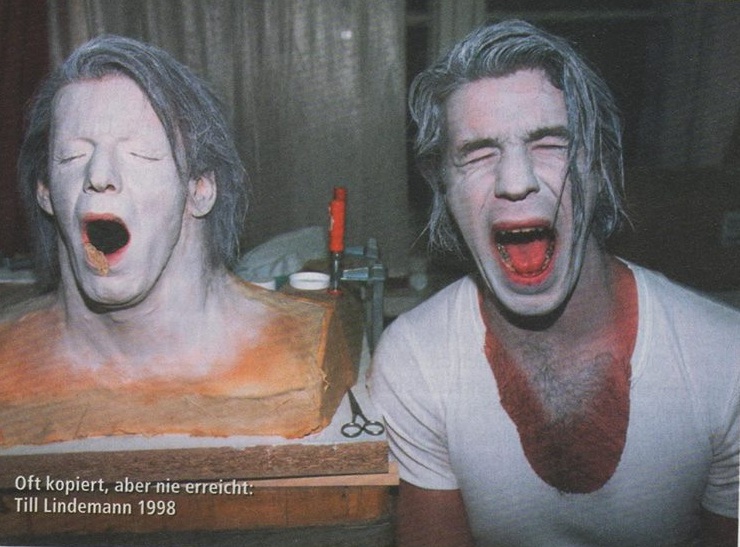
PERSEVERENCE
Say what you will about this tribute – but the fact that Heino chose a Rammstein song is testament in itself. He, or should we say, his management, has admitted what everyone already knows at heart: Rammstein counts as one of the most cutting edge, innovative and successful bands that Germany has ever produced. And they keep going strong on all fronts.
In October, 2004, the band once again proved that success and provocation don’t necessarily cancel each other out, but could complete the other. All while the moral guardians hollered themselves hoarse at the sight of the video for, “Mein Teil” and the cannibal-tribute clip was only allowed to be aired at night, Rammstein officially became the most successful German band abroad. They still are today – while former “competitors”, such as the Tokio Hotel twins Kaulitz, who these days at the most only make ripples in the tabloids by sporting some new, weird-ass hairdo.
One of the bases for the continuous effect of Rammstein’s impact: the band has – and, once again, we’re back to the four success-guarantees mentioned in the beginning — an impeccable sense of timing. Even if Rammstein had magnificent success in the wake of the “Mutter” tour in the US, the band didn’t continue touring there. For none of the subsequent albums, thus neither for ROSENROT (2005) nor LIEBE IST FÜR ALLE DA (2009), was the US at the top of the touring itinerary. It was only in December 2010, when Rammstein returned again – and managed to sell out Madison Square Garden in New York within 30 minutes. That was: 12,000 tickets. Spelled out: twelve thousand. Or, for as long as the server at the box office endured… Doesn’t matter, it’s a triumph for the band. A sign that they have done everything right. “Always leave’em wanting more.” An old-fashioned expression, sure – but true. But with a lot of patience and tenacity behind them, a big desire was achieved. “America has always been a dream for us,” admitted Richard Kruspe, “especially for me, personally. I feel more at home in New York than in Berlin.”
FURY AS FUEL
For how long he wants to stay in either location, Kruspe can these days choose freely. He and his colleagues are independent, and now more than ever, they can do what they please. Because of the success – but also despite the success. Rammstein does not hide, but they are, to this day, going their own way. Still with a great desire for provocation, as the amusing clip, “Pussy” has cemented, if nothing else. “We have a supreme motivation: to upset!” Paul Landers mischievously rejoiced, and added: “You cannot believe how much energy there is to be drawn from that!”
Odds are, quite a lot.
Source: www.rammstein.us
